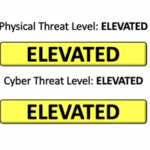
Faith-Based Daily Awareness Post 16 October 2025
Faith-Based Security Headlines
These updates are shared to help raise the situational awareness of Faith-Based organizations to best defend against and mitigate the impacts from all-hazards threats including physical security, cybersecurity, and natural disasters.
Beginning on Monday 20 October 2025, the DAP publishing schedule will permanently move to the afternoon to accommodate adjusting operational requirements. The DAP will still be published daily, with the exception of observed U.S. government holidays.
2026 Review of Self-Defense Protection Plans for Churches and Concealed Carriers
Christian Warrior Training has conducted a 2026 Review of Self-Defense Protection Plans for Churches and Concealed Carriers which examines the legal defense and liability coverages available to church security teams and concealed carriers. It is emphasized that even well-trained volunteers intervening to protect a congregation can face criminal prosecution or civil lawsuits, so having robust legal protection is critical. The research evaluated eleven major plans by reviewing their policies, leadership practices, exclusions, and fine print. Research criteria included: whether volunteers serving their church are explicitly covered, how legal fees and civil damages are handled, whether bail is included, coverage for non-firearm defenses, multi-state coverage, and clarity of contract language. He concludes that Right to Bear stood out for offering 50-state coverage, inclusive terms for volunteers and pastors, civil and criminal defense, high bail protection, and the option to pick one’s own attorney all for about $180 per year under a church-partnership rate. Keith argues that the self-defense protection industry should be more transparent, fair, and respectful toward Christian ministry volunteers. Including clearly covering non-firearm methods of defense, traveling volunteers equitably, and resisting hidden exclusive or discriminatory pricing.
Analyst Comments: The review offers a practical and faith-based perspective on the self-defense insurance landscape, especially for church security volunteers, a group often overlooked by mainstream providers. Grave’s analysis shows a legitimate gap in how protection plans handle religious and volunteer contexts, highlighting the need for clearer, more inclusive policy language. The article serves as a thoughtful resource for churches seeking to responsibly manage legal and financial risks associated with protective service ministries.
Is Chicago the violent crime capital of the US? What the facts say
The Al Jazeera article examines claims that Chicago is the “violent crime capital” of the U.S., particularly as advanced by political figures, and compares those claims against data. While Chicago does consistently lead U.S. cities by raw number of homicides reportedly holding the highest count among large cities for over a decade its homicide rate is far lower than in many smaller cities. The article also notes that roughly half of shooting incidents in the U.S. occur outside large metro areas, in smaller cities and towns. Data from global comparisons show that over 100 cities worldwide have higher homicide rates than Chicago, including Memphis, New Orleans, St. Louis, Baltimore, and others. The piece cautions that comparing crime across states or cities has pitfalls city boundary definitions, inconsistent crime reporting, and political cherry-picking of metrics all muddy the picture. In short: Chicago does have a serious violent crime problem, but the label “violent crime capital of the U.S.” is misleading when viewed through more precise measures.
Analyst Comments: The article highlights how public perception of crime in cities like Chicago often differs sharply from statistical reality. Politicians and media narratives can amplify fear by focusing on total homicide numbers rather than homicide rates or broader crime trends. In fact, violent crime in many U.S. cities, including Chicago, has declined from pandemic-era highs, even though certain neighborhoods remain disproportionately affected. The key takeaway is that crime risk is highly localized it varies significantly by neighborhood, time of day, and personal routine.
How Individuals Should Protect Themselves:
- Stay situationally aware
- Use official crime data tools
- Avoid routine predictability
- Secure personal property
- Community vigilance
Severe thunderstorms to form, shift eastward across the central US
AccuWeather warns that severe thunderstorms are expected to develop across the central United State and steadily shift eastward through the coming day. The storms could bring damaging winds, hail, and heavy downpours, posing threats to travel, outdoor activities, and power infrastructure. On Thursday, the risk focuses on the Plains, while by Saturday the threat zone expands through the southern Plains into central Illinois, Indiana, and parts of the Mississippi Valley. A moderate risk area has been identified from central Arkansas into southwestern Illinois, where more numerous storms and even a few tornadoes are possible. By Sunday, the system is expected to reach the southern Appalachians and Gulf Coast states, with cities like Atlanta, Birmingham, and Charlotte facing potential severe weather impacts. Meanwhile, due to their localized nature, these storms are unlikely to deliver the widespread rainfall needed to alleviate ongoing droughts, and river levels, especially on the Mississippi.
Analyst Comments: The forecast highlights a classic mid-October severe weather setup, where shifting jet stream patterns and lingering summer heat create volatile storm conditions across the Plains and Midwest. The article effectively communicates both the short-term hazard—damaging winds, hail, and isolated tornadoes and the broader meteorological context, such as the ongoing drought and low Mississippi River levels. The projection of a multi-day eastward shift underscores the system’s potential to disrupt travel and outdoor activities over a large region. However, AccuWeather’s emphasis on local variability and moderate risk areas suggests forecasters remain cautious about the extent of tornado development.
Case Study: Learn How Intelligence Can Inform Your Organizational Resilience
Join us for a case study discussion of how information in the real world helped inform resilience for a particular organization. Further, the case study will highlight how using information that is available widely can provide for proactive threat identification and mitigation locally – even at organizational level.
When: November 7th 12:00PM ET
Register Here.
More Faith-Based Stories
- Trump Gang Positions ‘No Kings’ Rallies as Excuse to Crush Dissent
- As the shutdown drags on, these people will lose if health care subsidies expire
- FEMA Denies Disaster Claims, Leaving States to Fend for Themselves
- How NSPM-7 Seeks to Use “Domestic Terrorism” to Target Nonprofits and Activists
- Trump vows federal ‘surge’ in more American cities to combat crime
- Don’t let MAGA turn protest into a crime
- Nation-state hackers breached sensitive F5 systems, stole customer data
- Shutdown Or Meltdown: Government Closure Threatens U.S. Cybersecurity
- Apparent hackers take over PA systems at 4 North American airports
- Scouts Can Now Earn AI and Cybersecurity Badges
- Alaska airlifting hundreds from storm-devastated coastal villages
- Hamas needs more time to recover hostages’ remains, U.S. advisers say
- Trump confirms he has authorized CIA covert operations in Venezuela
More Security-Focused Content

The FB-ISAO’s sponsor Gate 15 publishes a daily newsletter called the SUN. Curated from their open source intelligence collection process, the SUN informs leaders and analysts with the critical news of the day and provides a holistic look at the current global, all-hazards threat environment. Ahead of the daily news cycle, the SUN allows current situational awareness into the topics that will impact your organization.


